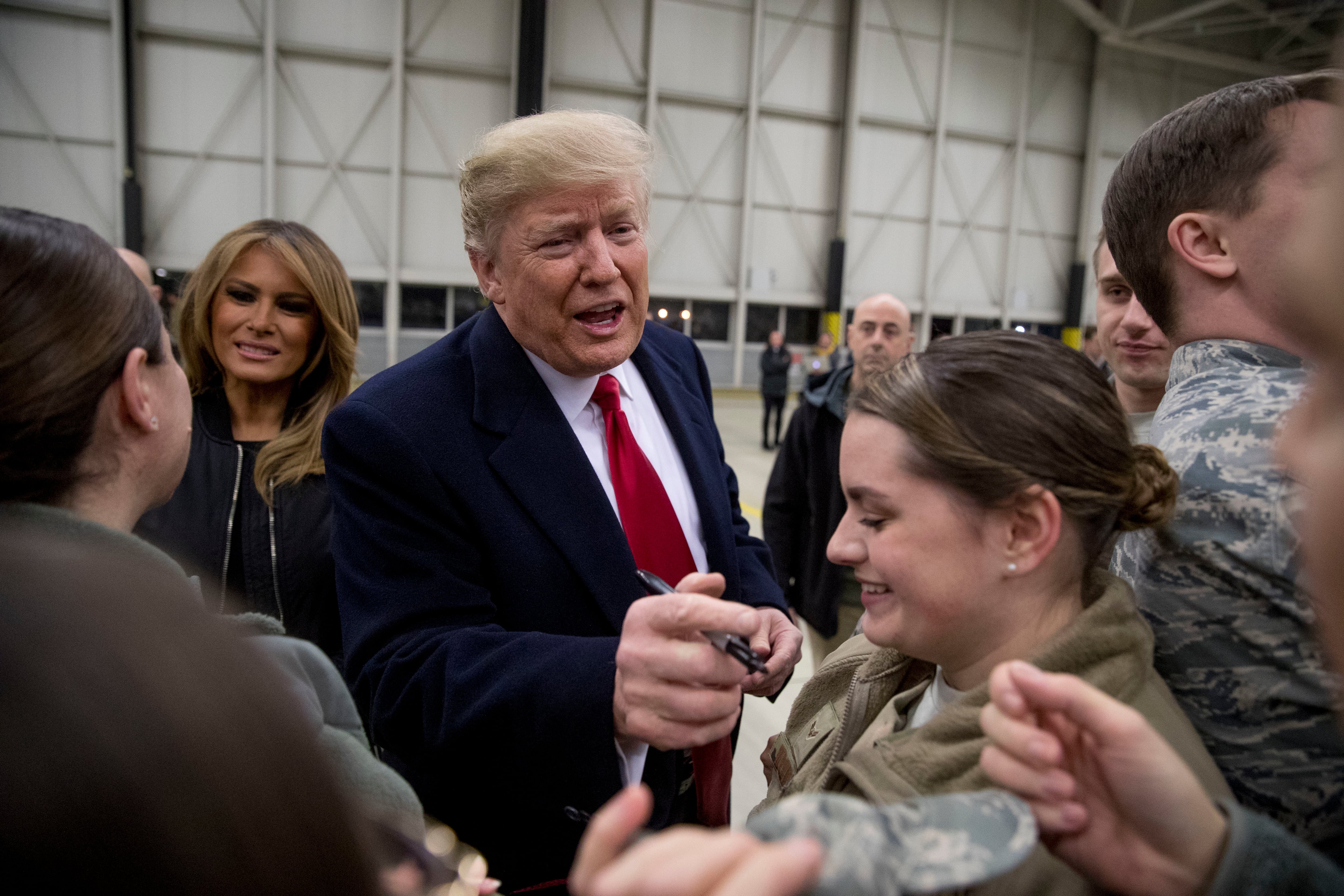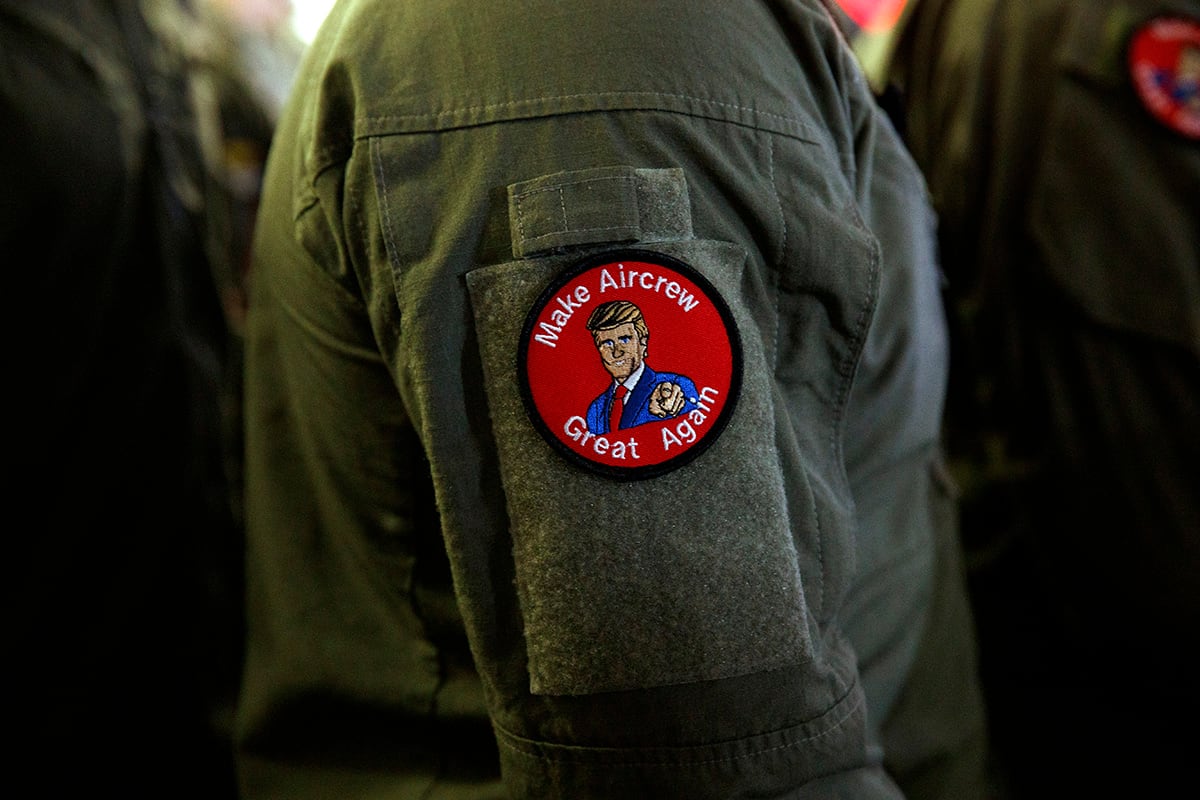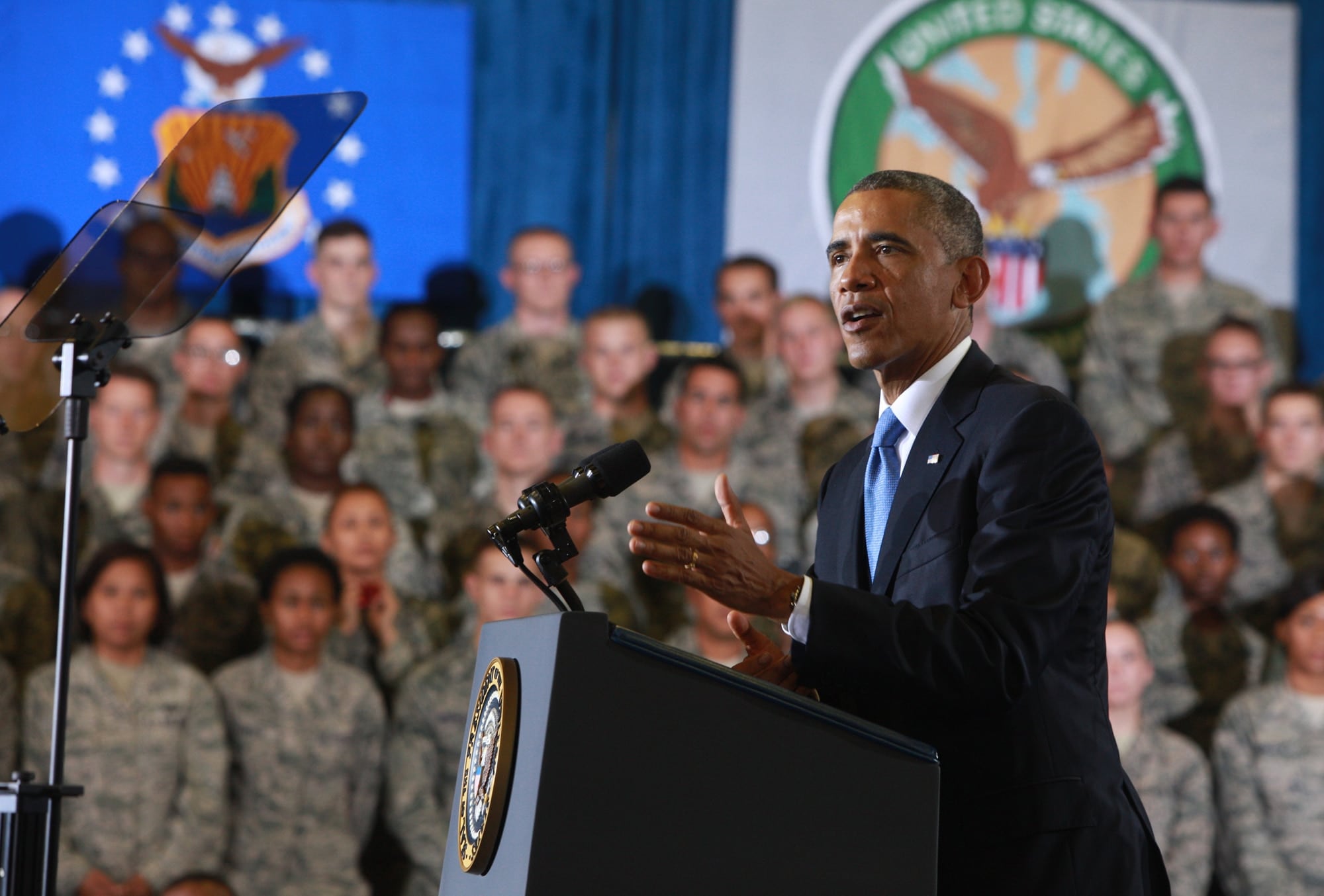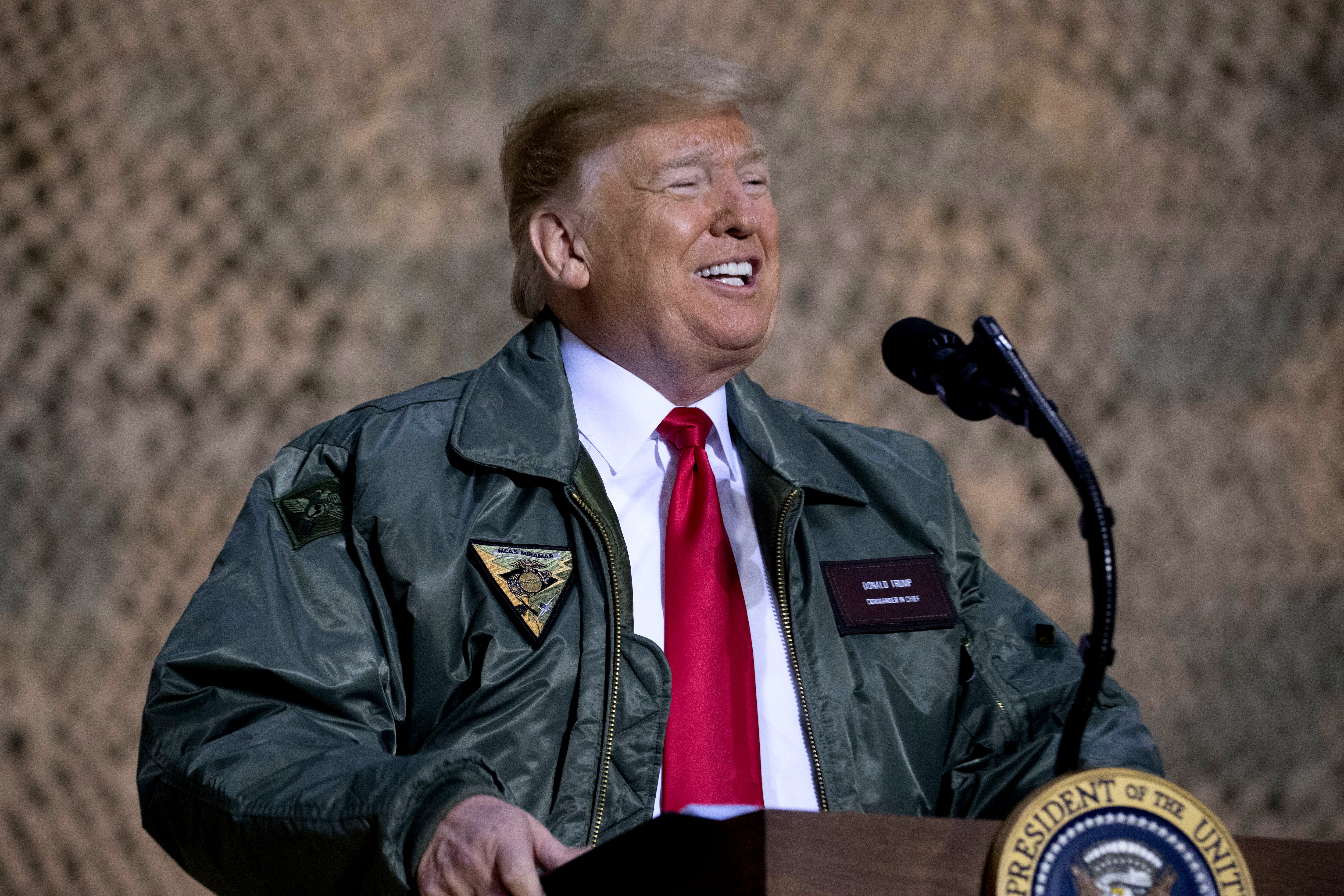A recent incident in which an Army National Guard major said “I hope and pray that you will be our next president” to former Vice President Joe Biden during a campaign rally has once again drawn attention to the role service members play in an increasingly partisan political landscape.
Because the officer was in uniform while endorsing Biden, it appears to be a fairly clear-cut violation of Pentagon policy, which states that all military members “are prohibited from wearing military uniforms at political campaign events.”
The military uses Department of Defense Directive 1344.10 to provide guidelines for how troops can and can not engage politically, but troops still find themselves under scrutiny from time to time.
The DoD guidelines partially exist to ensure that the military never appears as if its taking sides in the democratic process. As it stands, there is “virtually zero chance” that the U.S. armed forces would physically interfere in the electoral process, said retired Maj. Gen. Charles J. Dunlap, former deputy judge advocate general of the Air Force and current director of Duke Law School’s Center on Law, Ethics and National Security.
But there’s another reason to be wary of politicizing the military beyond the concern, however unlikely, of a military junta.
“The military needs to draw the best and brightest from all parts of the citizenry, and to do that it must be welcoming to people with differing political views,” Dunlap said. ”There can be no fact or perception of any sort of political litmus test for military service. A uniformed military officer endorsing a political candidate at a campaign event obviously undermines that effort."
Recently, however, instances have arisen that aren’t as easily discernible as an officer in uniform saying they pray for a particular politician to be president.
One of the most inflammatory events for some — and a non-issue for others — came when President Donald Trump visited troops in Iraq and Germany in December.
“While it wasn’t a technical violation of any rules, the recent incident on a military base where the president was asked to sign MAGA hats and other campaign paraphernalia is the kind of thing that’s nevertheless unhelpful to the military’s goal of being nonpartisan in fact and perception,” Dunlap said.
During the president’s holiday visit to Ramstein Air Force Base, Germany, and Al Asad Air Base, Iraq, service members were photographed holding red “Make American Great Again” hats for the president to sign. Because the MAGA slogan is synonymous with Trump’s 2016 presidential campaign, the event solicited a measure of condemnation from private citizens, including that of retired Army Lt. Gen. Mark Hertling.

“There are myriad reasons for both a Department of Defense and an Army Regulation against military personnel participating in or showing allegiance to ANY political party while in uniform," Hertling wrote over Twitter. "Good commanders enforce; good NCOs jerk a knot in the [expletive] of those who violate.”
However, U.S. Air Forces Europe said it was unaware of any actions that amounted to a violation of regulations during the Ramstein visit. For one thing, the event wasn’t a campaign rally. The president was visiting the base as part of his official duties and although troops brought their personal hats for signing, they weren’t wearing them in uniform.
“As a political history buff, I collect books written by politicians from both parties, which are my personal property. If a president from either political party showed up at my military command, I would definitely ask them to autograph my book,” said Navy Cmdr. Jonathan G. Odom, a military professor of law at the George C. Marshall Center in Garmisch, Germany, who shared his personal views on the subject with Military Times.
“But if you changed the facts of the situation, then my analysis might have been different," Odom said. "For example, if a box of MAGA hats had been distributed at the event to many or all of the service members present, then I think that would have been problematic. Or if they all wore the hats while they were wearing their military uniforms, then I also think that would have been problematic.”
In cases like this, Dunlap said service members should hew closely to Pentagon policy that advises them to "avoid the inference that their political activities imply or appear to imply DoD sponsorship, approval, or endorsement of a political candidate, campaign, or cause.”
But Dunlap also advised that political leaders be wary of what they explicitly or implicitly condone from their military supporters.
“Criticism of events on military installations might be avoidable if the White House put the word out that while the president appreciates his supporters, he doesn’t want those in the armed forces to do anything, particularly while in uniform, that would even appear to be improperly partisan," Dunlap said. "On this topic especially, commander-in-chief leadership is essential, and he needs to make it clear that he expects the rules to be followed in letter and spirit.”
Another situation arose in May, when the Navy confirmed it was reviewing whether service members photographed wearing a uniform patch with “Make Aircrew Great Again” embroidered on it violated DoD regulations.
This situation was more problematic, according to Odom, because while the MAGA hats are easy to acquire, someone had to go out of their way to design and produce these patches.

“Moreover, the fact that they were being worn on flight suits of more than one member of a unit suggests that the unit had some responsibility for either producing, distributing, or authorizing personnel to wear them on their uniforms,” Odom said. "In my view, any of those circumstances would be more problematic under the DoD policy.”
Odom also commented on another problematic incident involving personnel from Naval Special Warfare Group 2, who flew a flag on a tactical vehicle in January 2017 with what appeared to be the logo from the Trump presidential campaign.
“If a sign at an official military event said, ‘Welcome President Trump,’ I do not think that would necessarily be a problem. But if the campaign logo flag was flown at an official event or sites, then I think that would likely be problematic,” Odom said.
“By analogy," Odom added, "I recall that the Office of Special Counsel, which oversees political activities policy for all federal employees, issued a policy memo during the 2012 presidential campaign about the posting of Obama photos in the federal workplace. The posting of official photos of Obama was permitted, but the posting of his campaign photos was not.”
Politicization of the military isn’t something relegated to the current White House office holder. Dunlap noted that in his last official appearance before a military audience in December 2016, then-President Barack Obama told troops that they had a “universal right to speak your mind and to protest against authority, to live in a society that’s open and free, that can criticize a president without retribution.”
That’s actually not the case, Dunlap noted.
The Supreme Court ruled in the 1974 case Parker v. Levy that the First Amendment can be applied differently to military members than to the civilian population.
“Military law makes it pretty clear that troops do not, in fact, have a ‘universal right’ to ‘protest against authority,’ or to criticize the president in any fashion they want,” Dunlap said.

And while the outgoing president didn’t mention Trump by name, "to use a formal event on a military base to seemingly invite troops to criticize the incoming commander in chief of the opposing party risks inciting politicization inconsistent with the nonpartisanship that [the] military aims to achieve,” Dunlap added.
Odom said that because the current DoD policy on political activities was issued in 2008, it largely pre-dates the rise of Twitter and the boom of social media. But the guidance is still relevant.
For instance, the 2008 policy allows individual service members to write letters to the editors of newspapers expressing their personal views on public issues or political candidates. That activity just can’t be part of “an organized letter-writing campaign or a solicitation of votes for or against a political party or a partisan political cause or candidate."
And if a letter to the editor identifies the service member as being on active duty, then it should also state that their views are those of the individual and not the Department of Defense. Those same guidelines can still be applied to social media, according to Odom.
In Odom’s case, while he does discuss international law and security issues on his Twitter account, he includes a disclaimer on his profile that states "all views are personal.”
"At a minimum, I would recommend military personnel who are active on social media to include a similar disclaimer on their banner,” he said. “At the same time, I would caution the tone in which military personnel share their personal political views on social media.”
Odom noted that Article 88 of the Uniform Code of Military Justice makes it a criminal offense for any commissioned officer in the U.S. military to use “contemptuous words” against a slew of elected and appointed officials, including the president, the vice president, the secretary of defense and members of Congress.
“So even if you disagree with or [have] substantial concerns about a particular law or policy enacted by one or more of these senior government officials, you should be careful about the way in which you publicly express your differing political perspective,” Odom said.
Among the military members most active on social media are reservists who also serve as elected officials. U.S. Rep. Ted Lieu, for instance, is a vocal opponent of Trump, frequently taking to social media to criticize his policies as “chaotic and childish.”
But that doesn’t appear to violate any rules. Unlike active duty troops, reservists can run for elected office, speak at political gatherings, and provide punditry on a radio or TV program, according to the military. They just have to be doing so as civilians, and they can’t imply military endorsement of any party or candidate. If a troop is on active duty orders, though, active duty rules apply.
“Regarding social media, reservists not in military status and civilians have common-sense guidelines: don’t be unprofessional or threatening,” an Air Force Reserve Command notice advises.
Kyle Rempfer was an editor and reporter who has covered combat operations, criminal cases, foreign military assistance and training accidents. Before entering journalism, Kyle served in U.S. Air Force Special Tactics and deployed in 2014 to Paktika Province, Afghanistan, and Baghdad, Iraq.




